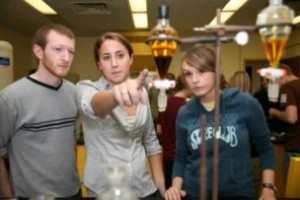 No school in the U.S. has ever been given approval to sell its biodiesel, until now. Loyola University Chicago Center for Urban Environmental Research and Policy’s (CUERP) Biodiesel Program has become the first school program to be licensed by state and federal authorities to produce and sell its biodiesel fuel. The program has received the approval of the Environmental Protection Agency, Internal Revenue Service, Illinois Department of Revenue, and the National Biodiesel Board.
No school in the U.S. has ever been given approval to sell its biodiesel, until now. Loyola University Chicago Center for Urban Environmental Research and Policy’s (CUERP) Biodiesel Program has become the first school program to be licensed by state and federal authorities to produce and sell its biodiesel fuel. The program has received the approval of the Environmental Protection Agency, Internal Revenue Service, Illinois Department of Revenue, and the National Biodiesel Board.
“The growth and success of our biodiesel lab has been amazing and we will continue to expand not only our production and sales, but also our outreach to schools, small businesses, and individuals interested in biodiesel,” said Zach Waickman, lab manager for the biodiesel program. “It is like running a small business that will be financially sustainable by finding unique ways to benefit the environment.”
The program already has a customer base with The Free Enterprise System, Inc., that runs the school’s shuttle service between campuses. The six buses will begin running on biodiesel and eliminate the use of nearly 3,000 gallons of diesel fuel each year. In addition to selling biodiesel fuel, the University will also sell the lab’s “BioSoap” at its campus stores and select retailers across Chicago. The BioSoap is made from the byproduct of the biodiesel fuel production, which is known as glycerin.
According to a University press release, the Biodiesel Program began in 2007 when CUERP was awarded a $10,000 grant from the EPA to implement a new program known as “Solutions to Environmental Problems” or STEP. The program’s first project was to focus on the problem of carbon dioxide (CO2) gas emissions on Loyola’s campuses. From there, the students identified, designed, and implemented an array of projects to contribute to the solution, including fuel-production research, the drafting of a biofuels legislative bill, the development of a documentary film, the establishment of the biodiesel lab, and outreach to local high schools that allowed teachers to deliver the STEP curriculum to their students. Today, the Biodiesel Program stands alone.
“Our work has just begun, as our Biodiesel Program plans to collaborate with other universities in the Chicagoland area to collect waste vegetable oil, convert it into biodiesel fuel, and then sell it to other community circulator buses and universities,” says Nancy Tuchman, vice provost and former director of CUERP. “I’m so proud of what our students have accomplished thus far, along with their passion for finding solutions that protect the environment and ultimately will make the Loyola community a greener place to live, work, and study.”

